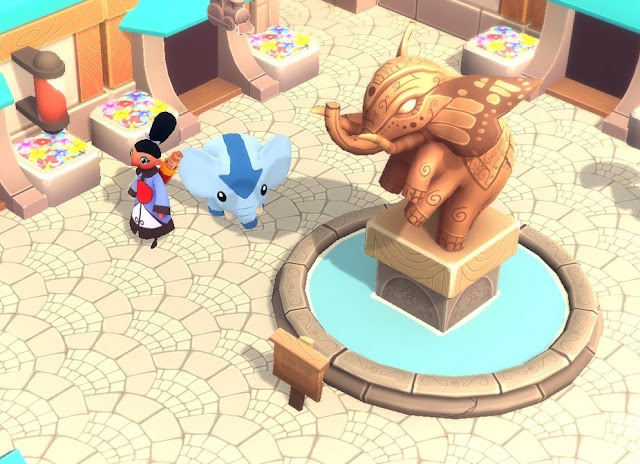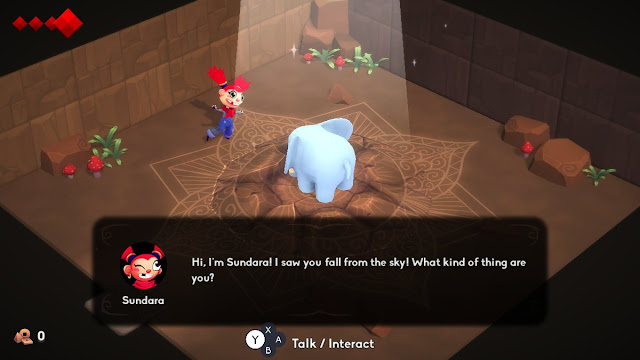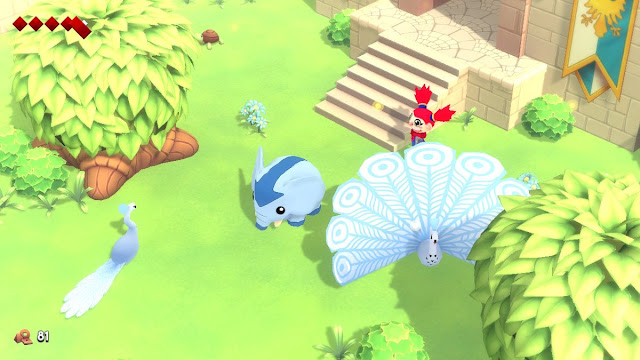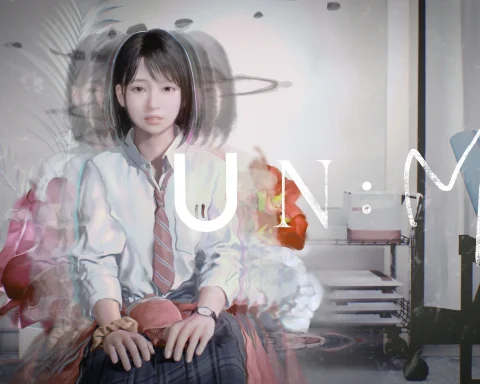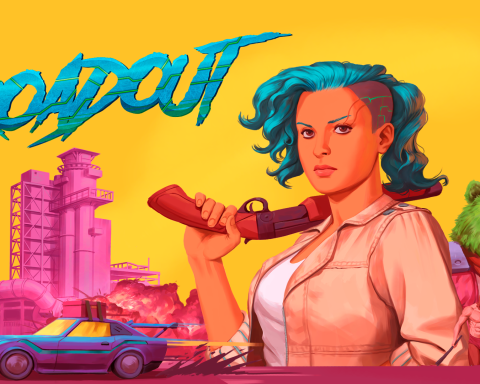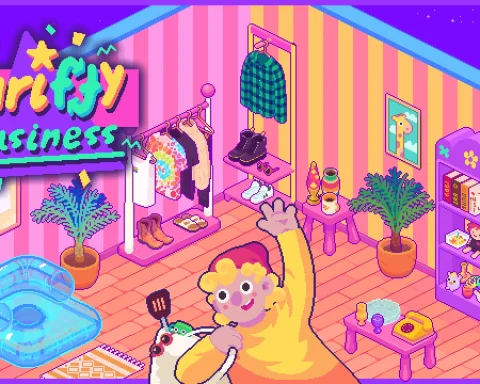Review by Ginny W.
Getting burnout as a consumer of games is a very real thing. You don’t have to be a games journalist to feel constantly overwhelmed by the stream of titles that gets churned out by big studios seemingly every other week. The Switch has had stellar support in its first year, and with less than week between big releases like Fire Emblem Warriors and Super Mario Odyssey, it’s easy to see how even fans can start to tire of these experiencing these huge games and their complexities back to back. Sometimes you need a palate cleanser, and if anything listed above resonated with you, then look no further than Yono and the Celestial Elephants.
The premise is simple, but charming – like a Saturday morning children’s cartoon. The graphics definitely contribute to a colourful and soft atmosphere, even in underground environments, and it’s perfect for the central narrative of the game. You play as Yono, an elephant, and the reason for your existence is to help the people in the world find peace. The order of celestial elephants is one that tries to restore order in times of dire need, and it is with this philosophy in mind that you set out on your adventure. Unlike other games which focus on the player character being some sort of all-powerful hero, Yono’s strength lies in his willingness to bring happiness and enlightenment to others, often for little to no recognition. This is a familiar tenet of Buddhism, and playing a selfless protagonist for a change can feel quite freeing – there’s no pressure to get the best gear for the sole purpose of inflicting harm on others. Your intentions and pure, and the game’s presentation does its best to reinforce that.
Much like the teachings of Siddhārtha Gautama, one of Buddhism’s most well-known thinkers, Yono and the Celestial Elephants introduces a central concern for the human condition as your motivation for doing good in the world. For a game that looks as unassuming as it does, you’re dealt a hand of rather heavy themes: racism, oppression, militarism and bureaucratic corruption all rear their heads, and it can be a little jarring when you first encounter incidents demonstrating the above after hours of harmless fun playing in fields of hedgehogs. However, those incidents being shocking only serve to motivate you more to do good. As was with the journey of Siddhārtha, it was only after he had been exposed to the suffering of others that he formed the motivation to live life as an ascetic and to dedicate himself to the wellbeing of others. Part of that dedication was foregoing pleasures and recognition, and the times in-game where Yono turned away a monetary award reminded me very strongly of Siddhārtha’s tale and of the karmic system of Buddhism.
It’s perhaps more fitting, then, that combat is wholly unremarkable. Engaging in this combat is usually also optional, barring the obligatory boss fights scattered throughout the game. You have the ability to headbutt things, and that’s about it. Sure, there were enemies in the form of snakes and other standard dungeon-dwelling foes, but unless a quest was specifically about eliminating them, I just chalked their existence up to yet another element to add to the puzzle-solving and went about things in a rather pacifist way. You do have a health system similar to the heart containers of Zelda, but I found that when I was losing health, it wasn’t due to combat but it was because I was occasionally exploring too close to the edge of a cliff.
As you’ve probably guessed by now, the main draw of Yono and the Celestial Elephants is the puzzle-solving. On a rudimentary level, it invites a lot of Zelda comparisons – the puzzles are largely about manipulating the environment and executing different actions based on obstacles around you to progress further and further into dungeons that get more complicated as time goes on. This isn’t a reinvention of the wheel by any means, and one comment that I will have regarding difficulty is that Yono is less about having to think particularly hard, and more about thinking outside of the box. Solutions aren’t always straightforward, and it’s often not the most obvious approach that is the correct one. Thankfully, it’s hard to mess up a puzzle in a way that hinders your progression; leaving the room or dungeon is enough to reset your progress in terms of items that you’ve moved around, so you’re never really punished for not being as quick as you need to be on the uptake. That’s not to say that a monkey could play the game blindfolded; Yono the Celestial Elephants is much more interested in delivering a philosophical narrative in style, and it didn’t need to be any more or less difficulty to facilitate that. Having to get rid of one’s usual preference for thinking linearly is also something that Buddhism encourages, and some of the puzzles were almost meditative in their order, which was a nice touch.
However, with all the fun comes more than a little frustration. I will note that Yono and the Celestial Elephants was a one-man job, and as such, a little roughness around the edges was expected. However, while the game’s general sparse approach to telling you what to do works well as a motivator in terms of getting you to teach yourself how things work, it can be hard to figure out exactly what you need to do once you encounter an NPC for the first time. For a game that’s all about interacting with different kinds of people and learning about their trials and tribulations, a little more guidance or signposting could have been helpful – I’m all about helping others, but I’d like it if the puzzle-solving was more about procedure and tactics than figuring which room in the city I was meant to have a five-second conversation with someone in. This and some of the unspoken rules of the game (i.e. items that you carry on your back despawning when you leave one area and go to the next) lead to some unpleasant scenarios where I had to backtrack a fair bit because I’d taken some quest items with me into another zone while trying to find where they were meant to go. Items not despawning while you entered areas that were a part of the same zone (but removed enough to warrant a loading screen) only added to the initial confusion, and while it wasn’t enough to make me feel like the game was actively conspiring against me, worrying about which whether a mystery door would take me out of an area did break the immersion of exploration more than a handful of times.
All in all, Yono and the Celestial Elephants is a game that is acutely aware of the great titles that it draws inspiration from, even it falls a little short in its well-meaning execution. The Zelda comparison is a prime example; you can acquire a cosmetic outfit in game that makes you look like Link, amongst other famous characters, and that’s just one instance of the title’s various puzzle game easter eggs. It is disarmingly cute and packs a narrative punch despite its exterior, so don’t let the children’s’ cartoon descriptor fool you. There’s a lot more than meets the eye when it comes to a title like this, and while you may come for the adorable stills of chickens and turtles riding around on your back, I do hope that you stay for a story about inclusion and acceptance that is remarkably topical in these turbulent times.
– Ginny W.
Contributor

